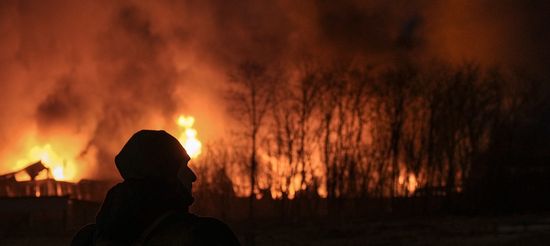When Russian soldiers invaded Ukraine in February, Iryna Stavchuk, thus many various other Ukrainians, had her world shook up.
At the time, she was the deputy preacher of environmental protection as well as natural deposits as well as had remained in the midst of working to assist the country meet European criteria on issues such as reusing as well as garbage disposal. Yet when bombs started to fall on Kyiv, she quickly changed her emphasis to emergency situation wartime procedures.
Russian forces have actually because been driven out of the funding and also the north region of the country, as well as displaced people in some locations have started to return to their residences. Though international attention on the fighting has actually subsided, the battles have actually surged on in the commercial south and east and the environmental damage wrought by the war continues to place.
Prior to the war, Ukraine was a country starting to make progress on environmental issues, Stavchuk claims. It was modernizing the pollution-emitting manufacturing facilities that had made it an industrial facility throughout the Soviet period.More Here quick essay writer At our site Yet those exact same sectors have made the nation extra prone to environmental damages under Russian strike. Scientific American spoke to Stavchuk, that left the ministry in May, about several of the major issues she as well as others have regarding the battle’& rsquo; s ecological toll. In regards to ecological dangers, what has scared you the most given that the invasion began?
Among the greatest overall dangers is that of nuclear mishaps, and it has actually been really terrifying to observe the tasks that were happening in Chernobyl and also at the Zaporizhzhia nuclear power plant. The Russian military obstructed electricity in Chernobyl, which regulated the radioactive-waste storage space facility, and the entire [containment area] additionally has its very own surveillance system, which requires electrical power.
In Zaporizhzhia, there was a fire in a management building. The Russians were killing the firemans that were attempting to stop the fire. They were utilizing eruptive weapons on the region of the nuclear power plant, and those tasks are very hazardous on contaminated websites.
Additionally, Ukraine is a commercial country, so we have a great deal of industrial plants, large ones—– chemicals, steel as well as others—– which, when it comes to army strike, can develop big regional air pollution.
And we have problems—– which date from 2014, from the war in Donbas [the area in eastern Ukraine where Russia has actually sustained separatist competitors]– pertaining to attacks on the coal mines. There is a lack of ability of coal mines to drain water, and that results in contamination of the underground water but additionally of the surface area water. This water, which is very polluted with different heavy metals and also many other poisonous compounds, is launched as well as it then goes into rivers.
What is happening currently with the Chernobyl and Zaporizhzhia plants?
The Zaporizhzhia nuclear reactor is under the control of the Russian military. There are agents from the Russian nuclear power firm Rosatom. The Ukrainian staff continues working at the plant however under the coordination and administration of these Russian reps of Rosatom. So generally, Rosatom exists to collaborate job, and we wear’& rsquo; t have much information on that particular. Regarding the Chernobyl exclusion area, when Russian soldiers left, Ukraine took control of the region, as well as they are currently trying to estimate all the influences. The system for the surveillance of contaminated air pollution in the exemption area was harmed, as well as there were also damages to various other systems. They’& rsquo; re now collecting all these realities to prepare for how much money and also resources are needed to rebuild.
What are some other continuous concerns you are worried concerning?
I would certainly say commercial disasters. There was one on April 9 in Luhansk [in the Donbas area] It was a storage tank with four tons of nitric acid that was ruined. And certainly, there have actually been assaults on the oil depots. That also has significant environmental effects, especially on air pollution.
In terms of land contamination, we had 2 instances with fowl ranches. When there is no power, it stops procedure, and also these poultries, they die very promptly. We wear’& rsquo; t know just how much [of the carcasses and other organic matter] was taken into the areas. There’& rsquo; s the threat of microbial contamination in groundwater.
What are some concerns with the combating moving to the southerly as well as eastern parts of the nation and with people beginning to go back to their residences?
Consuming water in Ukraine is among the targets of the occupiers, especially in the eastern and south. Russian soldiers are polluting fresh water by shelling plants and storage facilities near water bodies, which can result in leakages of dangerous materials. They have likewise damaged water-treatment facilities. As a result of the hostilities, water facilities—– consisting of sewage-treatment facilities—– are damaged in nearly all the cities of the Donetsk and also Luhansk regions in the areas controlled by Ukraine [since April]
In the south, the water system from the Dnipro River to the city of Mykolaiv has actually been damaged. For over a month, the citizens of Mykolaiv sanctuary’& rsquo; t had [regular] accessibility to clean water. [As of mid-April], information from UNICEF claim 1.4 million people in Ukraine have no access to secure water, and also 4.6 million have only limited gain access to.
All these activities are creating irreparable damage to marine ecological communities as well as affect human wellness. This will certainly be a growing issue as people start to go back to their houses. There is a fear that the damage of the water system in places such as Mariupol’ & rsquo; might bring about the spread of transmittable conditions, even cholera.
Politicians such as Boris Johnson have actually required a significant plan for reconstructing Ukraine. How should ecological issues fit into such a plan?
Certainly, we desire that. It’& rsquo; s likewise been stated by our president that there’& rsquo; s a particular chance for Ukraine to restore its cities and industries with brand-new environment-friendly innovations and techniques that incorporate power efficiency and also great planning for fewer discharges of greenhouse gases and additionally much less contamination of the air. Great preparation by itself in fact contributes to much better ecological results.



